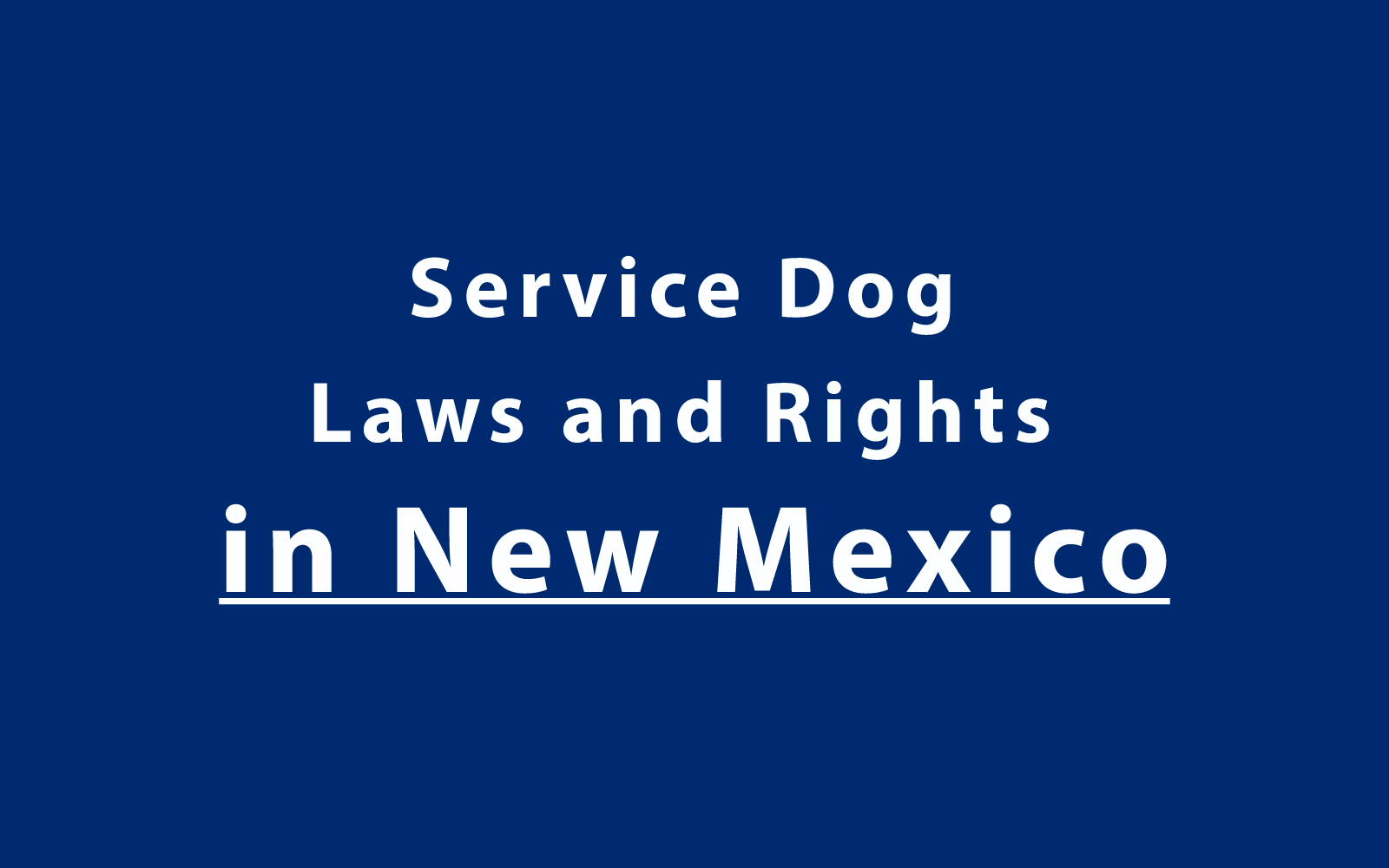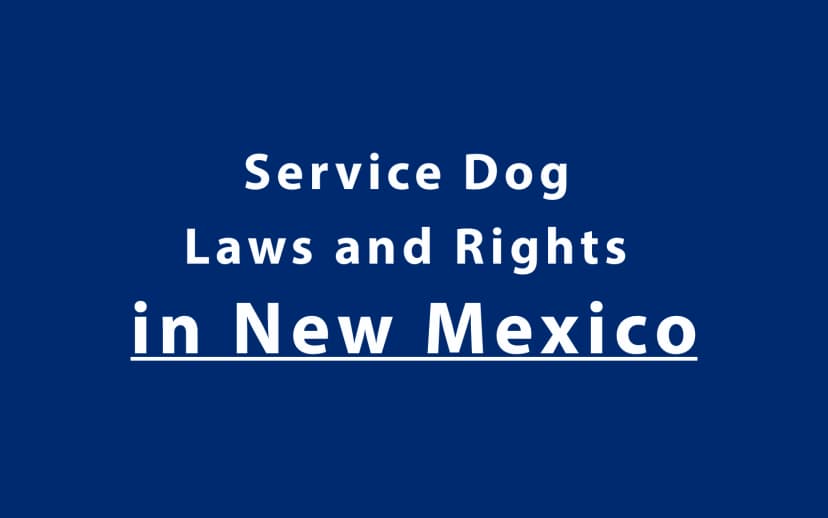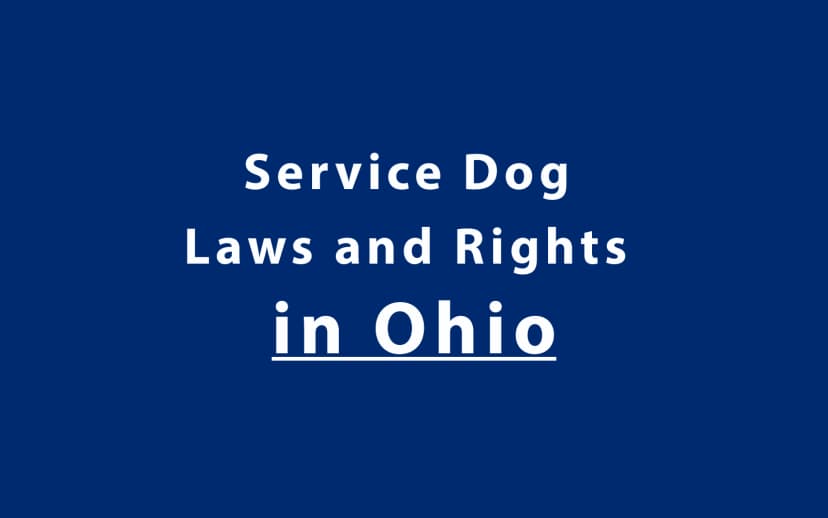Service Dog Laws and Rights in New Mexico

Service dogs play a vital role in the lives of individuals with disabilities, offering life-enhancing—and in many cases, life-saving—assistance. These specially trained animals can perform a wide range of tasks, from guiding individuals who are blind to alerting those with medical conditions or supporting people with psychiatric disabilities.
In the United States, service dog rights are primarily protected under federal law, but states also play a role in enforcing and interpreting these protections. New Mexico has aligned itself closely with federal standards while also implementing local provisions to support the rights of individuals who rely on service animals. This guide outlines the key service dog laws and rights specific to New Mexico, offering a comprehensive look at what handlers and the public need to know in 2025.
1. Definition of a Service Dog under Federal and New Mexico Law
Under the Americans with Disabilities Act (ADA), a service dog is defined as a dog that has been individually trained to perform tasks or do work for a person with a disability. The tasks must be directly related to the individual’s disability—for example, retrieving medication, providing balance support, interrupting self-harming behaviors, or alerting to seizures.
Emotional Support Animals (ESAs), comfort animals, and therapy dogs, while beneficial to their owners, do not qualify as service dogs under the ADA because they are not trained to perform specific tasks.
New Mexico adheres to this federal definition. The New Mexico Human Rights Act recognizes service animals as defined by the ADA and grants them similar access protections. The state does not provide a separate or conflicting definition, which helps ensure consistency across jurisdictions.
2. Public Access Rights in New Mexico
Service dogs are granted broad public access rights under the ADA and reinforced by the New Mexico Human Rights Act. Handlers can bring their service dogs into:
- Restaurants and cafes
- Grocery and retail stores
- Hotels and motels
- Government offices
- Hospitals and medical clinics
- Public transportation and airports
- Theaters, parks, and event venues
Handler responsibilities include:
- Keeping the dog under control at all times, either by leash, harness, or tether unless the handler’s disability prevents it or the device interferes with the dog’s tasks.
- Ensuring the dog is well-behaved and not disruptive. Barking, aggression, or a lack of housetraining can be grounds for removal.
- Maintaining care of the dog—businesses are not responsible for feeding or cleaning up after a service animal.
When access may be denied:
- If the dog is out of control and the handler does not take effective action.
- If the dog is not housebroken.
- If the dog poses a direct threat to the health or safety of others.
Importantly, staff may only ask two questions if a disability is not obvious:
- Is the dog a service animal required because of a disability?
- What work or task has the dog been trained to perform?
They cannot request documentation, demand the dog demonstrate its tasks, or ask about the handler’s specific disability.
3. Housing Rights
Under the Fair Housing Act (FHA), service dogs are considered reasonable accommodations in housing, even in buildings with “no pets” policies. This includes rental apartments, condos, and campus housing in New Mexico.
Key housing rights:
- Landlords must allow service dogs and cannot impose breed, weight, or size restrictions.
- No pet deposit or monthly pet fee can be charged for a service dog.
- Landlords may request limited documentation to verify the need for the dog if the disability or service the dog provides is not obvious. However, they cannot require training certificates or demand detailed medical records.
If a landlord refuses a legitimate request, tenants can file a complaint with the U.S. Department of Housing and Urban Development (HUD) or seek assistance from a disability rights group in New Mexico.
4. Employment Rights for Service Dog Handlers
Title I of the ADA protects individuals with disabilities in the workplace, including their right to use a service dog.
In the workplace:
- Employers must provide reasonable accommodations, which may include allowing a service dog.
- The request should be made through the company’s HR department or ADA coordinator, with a clear explanation of how the dog helps perform essential job functions.
- Employers can ask for documentation of the disability and the need for the dog, but not detailed medical records.
An employer may deny a request if:
- It imposes an undue hardship (e.g., significant difficulty or expense).
- The dog poses a safety risk or fundamentally alters the work environment.
New Mexico follows ADA Title I standards. Employees who face discrimination or denial of reasonable accommodation can file a complaint with the EEOC (Equal Employment Opportunity Commission) or the New Mexico Department of Workforce Solutions, Human Rights Bureau.
5. Air Travel and Transportation Access
Air travel is covered under the Air Carrier Access Act (ACAA). As of 2021, only trained service dogs (not ESAs) are permitted in the cabin, including psychiatric service dogs (PSDs).
To fly with a service dog:
- Handlers must submit the U.S. DOT Service Animal Air Transportation Form to the airline.
- The form confirms that the dog is trained, vaccinated, and fit to fly.
- No breed restrictions are permitted, though individual dogs can be denied boarding if they are out of control.
Other transportation in New Mexico:
- Public buses and trains must allow service dogs under the ADA.
- Taxis and ride-shares (e.g., Uber, Lyft) are also required to accept service dogs, regardless of company or driver preferences.
Complaints about service dog denials during travel can be directed to the U.S. Department of Transportation or local civil rights offices.
6. Service Dogs in Schools and Educational Settings
K–12 Schools: Students with service dogs are protected under the Individuals with Disabilities Education Act (IDEA) and Section 504 of the Rehabilitation Act. Public schools in New Mexico must allow service dogs to accompany students with disabilities, provided the dog is under control and does not disrupt the learning environment.
Colleges and universities are governed by the ADA. Institutions must allow service dogs in classrooms, dorms, and common areas.
To request accommodations:
- Contact the school’s disability services office.
- Submit a formal request detailing how the service dog assists with academic access or daily functioning.
Some institutions may require documentation that the dog meets basic behavior and hygiene standards, but they cannot require proof of certification or licensing.
7. Service Dog Training and Certification in New Mexico
There is no official state or federal registry for service dogs. Neither the ADA nor New Mexico law requires handlers to have an ID, certification, or license for their dog.
Training options:
- Service dogs can be self-trained by the individual handler.
- Others may work with professional trainers or programs.
Best practices include:
- Solid obedience training (sit, stay, heel, recall).
- Reliable task-specific behavior tied to the handler’s disability.
- Calm, controlled behavior in public settings.
Many scams sell “service dog certificates” online—these are not legally recognized and can mislead handlers and businesses alike.
8. Fraudulent Representation and Legal Penalties
Falsely claiming a pet as a service dog undermines public trust and the legitimacy of legitimate service dog users.
Under New Mexico law (Statute 28-11-6):
- It is illegal to misrepresent a pet as a service animal.
- Violators can face misdemeanor charges, fines, or other penalties.
Misrepresentation includes:
- Using fake service dog vests or ID cards.
- Claiming a dog is a service animal when it is not trained to perform disability-related tasks.
Suspected fraud can be reported to local law enforcement or the New Mexico Human Rights Bureau.
9. State Resources and Support for Handlers
Handlers and those seeking support in New Mexico can turn to several resources:
- New Mexico Department of Health – Disability Services: https://www.nmhealth.org/
- Disability Rights New Mexico (DRNM): Legal advocacy for individuals with disabilities – https://www.drnm.org/
- Service dog training organizations: Various nonprofits and trainers across the state offer obedience and task training programs.
- Vocational Rehabilitation Services: Assist with employment accommodations and accessibility support for working-age individuals with disabilities.
10. Frequently Asked Questions (FAQs)
Q: Can a business ask for proof that my dog is a service dog?
A: No. They may only ask if the dog is required because of a disability and what tasks the dog is trained to perform.
Q: Are psychiatric service dogs recognized the same way as other service dogs?
A: Yes. As long as they are trained to perform specific tasks, PSDs are fully protected under the ADA and New Mexico law.
Q: What should I do if I’m denied access or discriminated against?
A: Document the incident and contact the New Mexico Human Rights Bureau or the ADA Information Line. You may also consider legal counsel or advocacy groups for support.
Conclusion
New Mexico provides strong protections for service dog users under both state and federal law. Understanding these rights is crucial not just for handlers, but for business owners, landlords, employers, and educators alike.
If you’re a service dog handler in New Mexico, knowing your rights—and your responsibilities—can help you confidently navigate public, private, and professional spaces. Staying informed, respectful, and compliant is the best way to protect your access and advocate for the broader disabled community.
For further support, reach out to disability organizations, legal aid services, or professional trainers who understand the local and national landscape of service dog rights.



